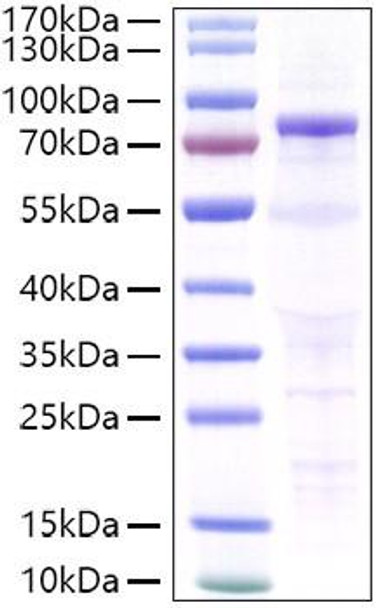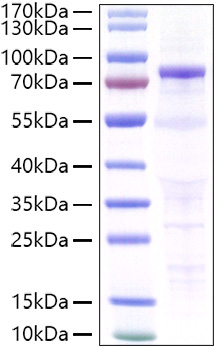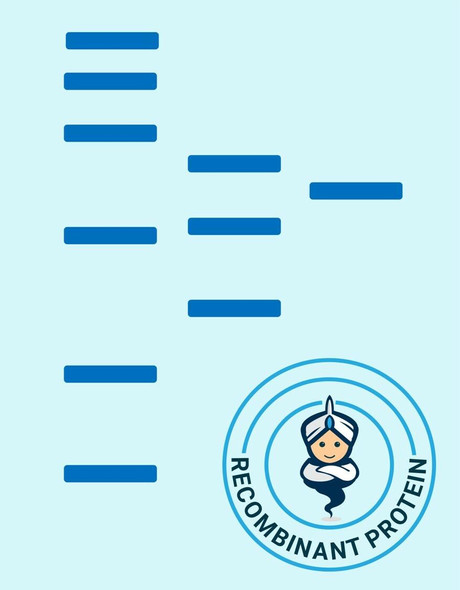Description
Recombinant Human CDH3/P-cadherin Protein
The Recombinant Human CDH3/P-cadherin Protein is a biologically active recombinant protein that plays a significant role in various cellular processes and signaling pathways in human biology. This protein is widely employed in immunological research, cell biology studies, protein-protein interaction analyses, and therapeutic development, providing researchers with a reliable tool for investigating CDH3/P-cadherin function and its implications in health and disease.
This product (SKU: RPCB1064) is produced using HEK293 cells and features a C-His tag for convenient detection and purification. The protein exhibits a calculated molecular weight of 60.86 kDa with an observed molecular weight of 70-80 kDa under denaturing conditions, achieving ≥ 85 % as determined by SDS-PAGE.. Functional bioactivity has been validated through rigorous quality control assays, confirming its suitability for demanding research applications.
Key Features
| High Purity by Affinity Chromatography | |
| Mammalian & Bacterial Expression Systems | |
| High lot-to-lot consistency via strict QC |
| Product Name: | Recombinant Human CDH3/P-cadherin Protein |
| SKU: | RPCB1064 |
| Size: | 10 μg , 20 μg , 50 μg |
| Reactivity: | Human |
| Synonyms: | CDH3, CDHP, HJMD, PCAD |
| Tag: | C-His |
| Expression Host: | HEK293 cells |
| Calculated MW: | 60.86 kDa |
| Observed MW: | 70-80 kDa |
| Gene ID: | 1001 |
| Protein Description: | High quality, high purity and low endotoxin recombinant Recombinant Human CDH3/P-cadherin Protein (RPCB1064), tested reactivity in HEK293 cells and has been validated in SDS-PAGE.100% guaranteed. |
| Endotoxin: | < 1 EU/μg of the protein by LAL method. |
| Purity: | ≥ 85 % as determined by SDS-PAGE. |
| Formulation: | Lyophilized from a 0.22 μm filtered solution of PBS, pH 7.4. |
| Bio-Activity: | Measured by the ability of the immobilized protein to support the adhesion of A431 human epithelial carcinoma cells. When 1×105 cells/well are added to rhP-CAD/Fc Chimera coated plates (10 μg/mL with 100 μL/well), approximately 50-60% will adhere after 1.5 hours at 37° C. |
| Reconstitution: | Centrifuge the vial before opening. Reconstitute to a concentration of 0.1-0.5 mg/mL in sterile distilled water. Avoid vortex or vigorously pipetting the protein. For long term storage, it is recommended to add a carrier protein or stablizer (e.g. 0.1% BSA, 5% HSA, 10% FBS or 5% Trehalose), and aliquot the reconstituted protein solution to minimize free-thaw cycles. |
| Storage: | Store at -20℃.Store the lyophilized protein at -20℃ to -80 ℃ up to 1 year from the date of receipt. After reconstitution, the protein solution is stable at -20℃ for 3 months, at 2-8℃ for up to 1 week. |
Cadherin-3 (also known as P-cadherin)is a classical cell-to-cell adhesion molecule with a homeostatic function in several normal tissues. They preferentially interact with themselves in a homophilic manner in connecting cells; cadherins may thus contribute to the sorting of heterogeneous cell types. In humans, cadherin-3 is only detected in a few organs. However, its overexpression is strongly associated with a poor prognosis in some solid tumors including breast, lung and pancreatic cancers.







